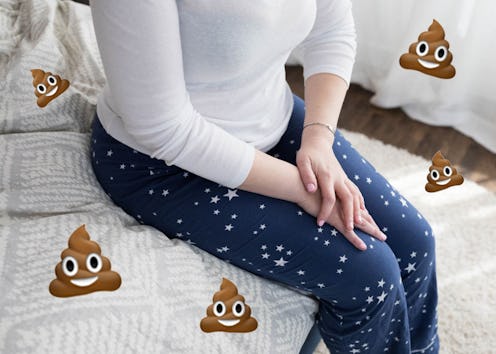Life
7 Things Your Poop Is Trying To Tell You About Your Health

Get your giggles or cringes out, because we need to talk about poop and what it's trying to tell you about your health. Your bowel movements are probably something you want to just get done, and never have a discussion about, but ignoring your stools (and what they indicate) can mean you're ignoring your body’s way of communicating health issues. Even if your poop looks normal, it's giving you a picture of what's happening inside your body. Poop may be an awkward topic, but it’s a normal bodily function that obviously serves a purpose.
I get that talking about our bodily waste may not be the most pleasant thing, but poop can actually provide a lot of insight into to your physical health, and noting any changes could help you catch a problem before it progresses. Colorectal cancer is the fourth most common cancer diagnosis in the United States, but its mortality rate has reduced with routine colonoscopies and fecal testing. If you think this only affects elderly folks, you’re wrong: despite the fact that colon cancer is usually diagnosed in people over 50, scientists have seen an alarming rise of the cancer in young people. Not to mention, there is an abundance of gastrointestinal issues that can alter everything from your stool’s consistency to the frequency you go to the bathroom. Here are seven things your poop can help you understand about your health.
Stool color is wide-ranging, and almost never indicates a serious issue
The color of your poop can range from green to dark brown and still be healthy; every person has a “normal” color that is unique to them. If the color of your poop changes, it may tell you that that you have extra bile in your stool (green or yellow), blood (black or red), or that you simply ate something, like a beet, that essentially dyed your stool. You should begin to worry about your stool color is if it is bright red or black, and you haven’t eaten anything that would alter it, which could indicate bleeding somewhere in your intestinal tract.
If you have chronic diarrhea, there’s a good chance you have Irritable Bowel Syndrome (IBS)
IBS is accompanied by a wide range of symptoms, but most notably includes stomach pain, excessive gassiness, and chronic diarrhea. The illness may feel a bit embarrassing, but IBS is common and diagnosed in 200,000 American adults every year. While diarrhea could mean you have you have an infection or endocrine disorder (like hyperthyroidism), IBS is the mostly likely cause.
Floating or sinking stool may tell you what vitamins you need
Basically, the buoyancy or density of your poop is an indicator to the composition of your food intake. Often times, if you change your diet or eat something out of the norm, you may experience more flatulence that leads to floating stools. Niket Sonpal, M.D., assistant clinical professor of gastroenterology at Touro College of Osteopathic Medicine in New York City, said to Women’s Health, “Most of the time, [floating stool] is normal. But it could be a signal that something is starting to brew. Normally, stool is a solid thing—and it shouldn’t really float or stick to the toilet.” Floating stools could also mean you are experiencing malabsorption, and that your body is not correctly processing fat or vitamins. However, it's not something to worry about unless it's a reoccurring pattern.
Blood in your stool can be an indicator of serious and mild health issues
Blood in your stool may seem ominous, but majority of time, it just means you have hemorrhoids, anal fissures, peptic ulcers, or a case of food poisoning that’s irritated your intestinal lining. If you aren’t experiencing any of the above, bloody stools can point to cancer or a precancerous condition, and you may want to schedule a colonoscopy just to be safe.
Super smelly bowel movements may mean you have bacteria in your GI tract
This may be one of the grosser topics your poop wants to tell you about, but the smell of your stool does have bearing on physical health. While stool is never supposed to smell pleasant, extremely putrid stool can mean you have bacteria in your colon, or you just ate something extra stinky. It can also mean you have a food intolerance if the smell is recurring.
Food in your stools is almost never worrisome
If you notice undigested food in your bowel movements, there is usually no cause for concern — no matter how unsettling it might be. Most of the time, food shows up in your bowel movements due to high fiber content; vegetables and nuts are super common. However, routine undigested food showing up in your poop could indicate an gastrointestinal infection or disorder.
The consistency of your poop can mean you're constipated or going to have diarrhea
Stool that is pebble-like, lumpy like sausage, or cracked usually signals some level of constipation, or that your poop is taking too long to pass through your intestine. Conversely, if your stool is loose or not well-defined, it be a warning that you’re about to have diarrhea, or that you already have it. While healthy poop consistency is generally described as smooth and snake-like, you may have a normal consistency that leans towards pebble-like or loose depending on lifestyle choices, or any illnesses.
Missing these important signs simply because your grossed out by your bowel movements could lead to health issues going undiagnosed, or worsening symptoms. Taking a look in the toilet every now and again for the sake of your health is worth it, even if it's gross.